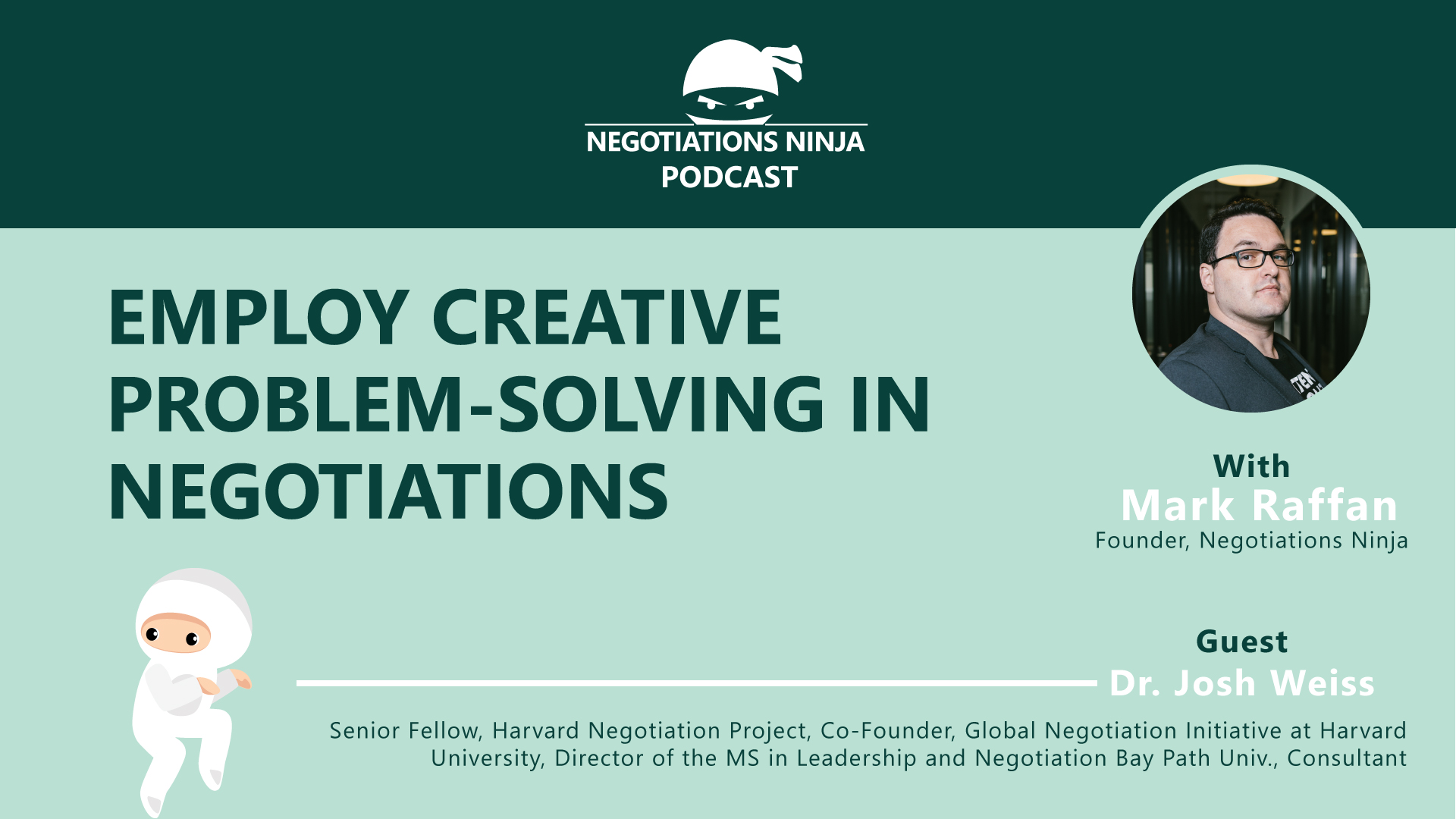Dr. Josh Weiss spends a lot of time in the conflict realm. He works at the Global Negotiation Initiative, has his own negotiation consulting company, and runs a completely online master’s degree program in leadership and negotiation at Baypath University. The goal of Josh’s book, The Book of Real World Negotiations, was to tell real-life stories to show people the most effective way to negotiate—using creative problem-solving. This book gives real-world, real-life examples of being able to bring creativity into the problem-solving process. Listen to this episode of Negotiations Ninja to hear his stories.
Outline of This Episode
- [1:42] Who is Dr. Josh Weiss?
- [5:25] The post-settlement settlement
- [14:49] Understanding underlying interests
- [22:42] Addressing cultural differences
- [28:33] Your mindset is the key
- [32:48] How to connect with Dr. Weiss
The post-settlement settlement
Howard Raiffa popularized the concept of the “post-settlement settlement.” What is it? Before you sign an agreement, you should ask your counterparty, “Is there any way that we could make this better for both of us?” When asked in the right way, it can be a great way for both parties to engage in creative problem-solving. It allows you to brainstorm ideas—without the pressure of still trying to reach an agreement—to bring more value to the table. How does it work in action? Dr. Weiss shares a story from personal experience in this episode. Listen to hear how it works!
Understanding underlying interests
BATNA means “What do you do if you can’t reach an agreement?” In a chapter in his book, Dr. Weiss talks about a firm (DOAR) that connects expert witnesses with law firms. They had been working with a law firm whose lawyer wouldn’t sign the limited liability waiver in this case (a multi-billion dollar lawsuit). They had never had a problem in the past. They tried to get down to “why” the lawyer wouldn’t share the underlying interest. The bottom line was that he didn’t want to take on the risk if something were to happen—he wanted DOAR to. But taking on the risk could put them out of business if something happened. How did they resolve the situation? Creative problem-solving. Dr. Weiss helped them look at their underlying interests. After some brainstorming, they realized that the expert witness could assume the risk because he had an LLC.
Addressing cultural differences
Dr. Weiss worked with two companies from two different cultures that had to get creative to move past their cultural differences. How did they do it? A German company decided to sell a famous movie studio. It was part of a larger plot that included offices and land. A French party wanted to buy it. It was an icon of German history, so they had to be careful to preserve it in the sale. Luckily, the buyer wanted to continue to use it as a movie studio. The problem was that they had a gap in their zone of possible agreement.
France and Germany have had their struggles over the years, and their negotiating styles are very different. Germans are more direct, and the French are more diplomatic. To their credit, the lead negotiators decided to form a working group to bridge the gap. They would agree to sell the studio and the offices, but the land was put up for sale separately. As they sold them off, each party got resources from these sales.
When you’re stuck, you need to try and break an issue into its components. If you have a problem with the budget, think about what you could hold off or remove from the deal to change the numbers. There are so many ways to approach problems to come up with creative solutions.
Your mindset is the key
If you go into a negotiation and you think that you’ll need to employ creative thinking to get to a solution, you’ll figure it out. The problem is the issue on the table. Anyone that’s problem-solved before knows the first idea won’t land. It takes patience. There isn’t a textbook out there that says, “rush through this as fast as you can.” but most negotiators seem to be in a hurry. As you go, information slowly reveals itself. If you go down a road and it’s blocked, flip the problem and look at it differently. Try and break it down. The conversations after you hit a dead-end can be transformative.
To hear more real-world stories than can change the way you negotiate, listen to the whole episode of Negotiations Ninja!
Resources & People Mentioned
- The Book of Real World Negotiations by Dr. Josh Weiss
Connect with Dr. Josh Weiss
Connect With Mark
- Follow Negotiations Ninja on Twitter: @NegotiationPod
- Connect with Mark on LinkedIn
- Follow Negotiations Ninja on LinkedIn
- Connect on Instagram: @NegotiationPod




